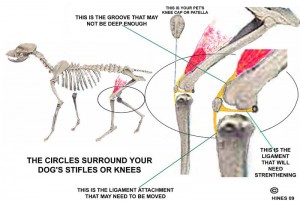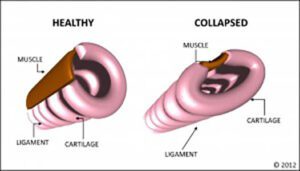The Pomeranian is a sturdy little dog that tends to live a long, healthy life. However, like all breeds, they are prone to certain health issues concerning Pomeranians that every Pommy Mommy (or Daddy!) should be aware of. Recognizing these health issues concerning Pomeranians early can make a huge difference in your Pomeranian’s quality of life.
In this post, we’ll cover the most common health issues concerning Pomeranians and provide tips on managing them.
Patella Luxation: Slipping Kneecaps
 One of the most common health issues in Pomeranians, and many other toy breeds, is patella luxation, or slipping kneecaps. This condition occurs when the kneecaps either float around the middle of the leg or become fused, preventing the leg from bending properly.
One of the most common health issues in Pomeranians, and many other toy breeds, is patella luxation, or slipping kneecaps. This condition occurs when the kneecaps either float around the middle of the leg or become fused, preventing the leg from bending properly.
Our little Sophia suffers from severe patella luxation. While this condition is usually painless, it can cause discomfort and mobility issues for some dogs. If your Pomeranian shows signs of pain, consult your vet about potential treatments, which may include medicinal therapies.
Managing Patella Luxation
To support joint health, especially in Sophia’s legs and knees, I provide her with the following supplements:
- Crushed alfalfa tablets
- Powdered Vitamin C
- A natural glucosamine/chondroitin supplement (be sure to choose one without unnecessary fillers)
This regimen has helped manage Sophia’s condition, and thankfully, she hasn’t shown any signs of pain from her patella luxation.
Collapsing Trachea: Breathing Problems in Toy Breeds
 Another common health issue concerning Pomeranians is collapsing trachea, which affects many toy breeds. Poms with collapsing trachea may emit a sound resembling a honk when they get excited or cough as if something is stuck in their throat.
Another common health issue concerning Pomeranians is collapsing trachea, which affects many toy breeds. Poms with collapsing trachea may emit a sound resembling a honk when they get excited or cough as if something is stuck in their throat.
What Is Collapsing Trachea?
The trachea, or windpipe, is made of sturdy rings of cartilage that allow air to pass to and from the lungs. In some dogs, these rings begin to weaken and collapse, obstructing airflow and causing the honking cough characteristic of this condition. The cause of collapsing trachea is unknown, but it is considered a congenital abnormality in which the cartilage becomes structurally weak.
What to Do If Your Pomeranian Coughs or Honks
If your Pomeranian starts exhibiting these symptoms, call your vet immediately. Early diagnosis and treatment can make a significant difference in managing this condition. Unfortunately, Maggie’s sister, Sheika, had this condition and was misdiagnosed before passing away.
Coat Loss and Black Skin Disease (Alopecia X)
Pomeranians are known for their thick, luxurious coats, but some may suffer from coat loss, also known as Black Skin Disease or Alopecia X. This condition can be frustrating and challenging to diagnose, as it has many potential causes.
Causes of Coat Loss in Pomeranians
Common causes of coat loss include:
- Hypothyroidism (low thyroid)
- Cushing’s disease
- Eczema
- Mites
- Fungal infections
- Allergies
Accurately diagnosing the cause of coat loss is often a long, expensive, and inconclusive process. Your veterinarian can help determine the underlying cause and suggest a treatment plan.
For more information, visit resources like Black Skin Pomeranians, which provides detailed information on managing this frustrating condition.
Heart Issues: Monitoring Your Pomeranian’s Heart Health
Heart issues are common in all dogs, and Pomeranians are no exception. The most common heart condition seen in Pomeranians is a heart murmur, an abnormal heart sound that can either be harmless or indicate a more serious issue.
Living with a Heart Murmur
Maggie, one of our Pomeranians, has lived very well with a heart murmur. While her condition is relatively mild, we ensure that our vet monitors it regularly. Even if a heart murmur is harmless, it’s essential to get it checked by a veterinarian to rule out any severe underlying conditions.
Seizures and Epilepsy in Pomeranians
Seizures in Pomeranians can be frightening, but understanding their causes can help you manage them. Some seizures may occur as a one-time event or can be a symptom of a more significant issue, such as idiopathic epilepsy, which means repeated seizures with no known cause.
Causes of Seizures in Pomeranians
- Liver shunt
- Head injuries
- Severe hypoglycemia (low blood sugar)
- Hydrocephalus (water on the brain)
- Epilepsy
In young Pomeranian puppies, head injuries are the number one cause of seizures and death. Many new Pommy Mommies and Daddies are unaware of how fragile their Pom’s head can be. Holding your Pomeranian properly and supervising children who may accidentally drop them is crucial. Unfortunately, Maggie’s sister Sheika suffered from frequent seizures despite being medicated and eventually passed away from one.
Hypoglycemia: The Danger of Low Blood Sugar
Hypoglycemia, or low blood sugar, is another common issue in Pomeranians, especially puppies. It occurs when the body doesn’t have enough glucose (sugar) to fuel the brain and muscles.
Symptoms of Hypoglycemia in Pomeranians
- Lethargy or unusual sleepiness
- Lack of energy
- Seizures (in severe cases)
- Coma (in severe cases)
Insufficient or low-quality food, excessive exercise, or even too much handling and play can cause hypoglycemia. Young Pomeranians must eat high-quality food and not overexert themselves.
Treating Hypoglycemia
If you notice signs of hypoglycemia, it’s essential to act quickly. Provide your Pom with a fast source of sugar, such as Karo Syrup or honey, but only after consulting your vet. In most cases, this will resolve the issue. However, if the hypoglycemia is due to liver disease or another underlying health issue, it may become a chronic, life-threatening condition that requires ongoing medical care.
Be Aware, Be Prepared
As a Pommy Mommy, you must stay vigilant and be prepared for any health issues concerning Pomeranians. While Pomeranians are generally healthy dogs, they are prone to specific ailments that require careful attention and care.
You can ensure your Pomeranian’s long, happy, and healthy life by staying informed about conditions like patella luxation, collapsing trachea, coat loss, heart issues, seizures, and hypoglycemia.
If you suspect your Pomeranian is experiencing any of the symptoms discussed in this article, contact your veterinarian immediately for a proper diagnosis and treatment plan. Early intervention is critical to managing these common health issues concerning Pomeranians and keeping your furry companion at their best.
Related Posts:
Pomeranian Health: How to Keep Your Pom Healthy
Pomeranian with Collapsing Trachea
What to Do When Your Pomeranian Has a Seizure
7 Most Common Pomeranian Emergencies
